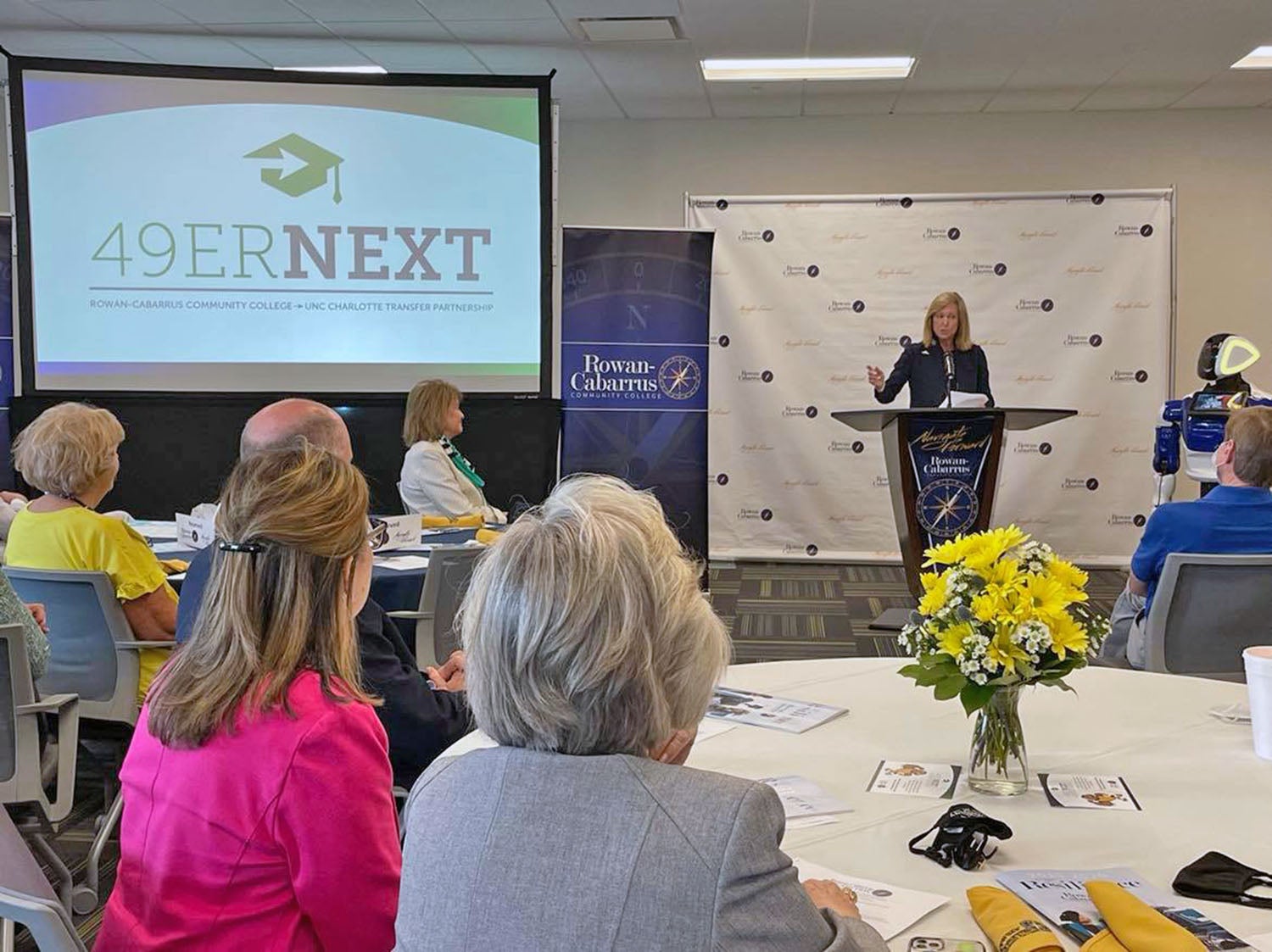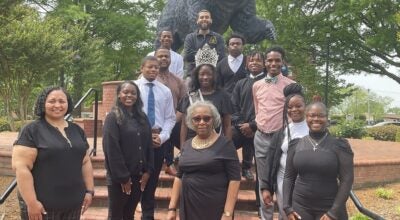Rowan-Cabarrus Community College, UNC-Charlotte launch ’49erNext’ program for transfer students
Published 12:10 am Tuesday, June 29, 2021

- Natalie Anderson/Salisbury Post — UNC-Charlotte Chancellor Dr. Sharon Gaber discusses the launch of the 49erNext program to Rowan-Cabarrus Community College foundation members at the Cabarrus Advanced Technology Center Monday, June 28, 2021. The program aims to simplify and guarantee admission into UNC-Charlotte for select RCCC transfer students.
By Natalie Anderson
natalie.anderson@salisburypost.com
KANNAPOLIS — Rowan-Cabarrus Community College has launched a program called “49erNext” to guarantee admission for select students transferring to the University of North Carolina-Charlotte.
The program was made official at a meeting Monday with the RCCC Board of Directors and trustees. Following a presentation, RCCC and UNCC leaders formally signed the agreement to launch the program.
“What we really set out to do is to make sure that when a student got an associate’s degree from Rowan-Cabarrus or one of our other partner institutions, that they would come to UNC-Charlotte and really be juniors and not have obstacles before they could really start the program that they came to UNC-Charlotte to do,” said UNC-Charlotte Chancellor Sharon Gaber.
Prioritized for first-time, full-time RCCC students, the 49erNext program seeks to simplify the transfer process by providing RCCC students with guaranteed admission at UNC-Charlotte after completing an eligible associate degree and meeting certain GPA requirements. The program aims to promote student success by offering collaborative advising for financial aid, timely degree completion, future careers and financial literacy skills.
Students who qualify will also have access to UNC-Charlotte amenities and services, including the library, the new recreation center, athletic events and CATS public transit. Additionally, 49erNext students will also qualify for early registration, with the opportunity to register for classes weeks or months in advance.
Katie Ramstack, who’s leading implementation of the 49erNext program, said a priority is placed on those intending to complete an associate’s degree in arts, science or engineering from RCCC. Those students could pursue nearly all of UNC-Charlotte’s 130 majors and nearly 75 various programs. Architecture, nursing and fine arts are excluded because they have special requirements.
Ramstack said RCCC prepares around 120 transfer students each year for UNC-Charlotte through its early college and transfer programs. The goal for RCCC’s first cohort is 17 students.
Ramstack said 49erNext student transfers from RCCC can choose from six areas of study known as meta-majors, which form an umbrella of comparable programs that allow for some changes without getting off-track if students change direction. Meta-majors also allow for a guided pathway for degree completion.
North Carolina Community College System President Thomas Stith III attended Monday’s meeting and credited the program with strengthening the three pillars of the system. Those pillars include being the first choice in North Carolina for accessible and affordable education, leading the state’s economic recovery and sustained growth and being a national model for diversity and inclusion.
“The strength of North Carolina and our competitive advantage, not only regionally and nationally but globally, is the diversity of the people of our state,” Stith said. “That’s the strength of our state. So we’ll build upon that.”
Stith also highlighted a few statistics about North Carolina’s community college system, which is the third-largest, noting about 33% of graduates remain in the state. Stith said community colleges will serve as the training ground for future employees.
“We are the economic engine of the state, and we will continue to build on the success that we’ve had,” he said.
Salisbury Mayor Karen Alexander, a board member for the RCCC Foundation and a UNCC alumna, said the 49erNext program is another asset in training that workforce.
“The partnership between the university and the community college is very powerful because it sets in motion that next step,” Alexander said. “So all these things are coming together to really affect not only our county, but (also) our whole state. And it’s very exciting.”
East Spencer Mayor Barbara Mallett, another foundation board member, said the partnership will open avenues for young people who might not have had the knowledge to “move on to the next level.”
“If you don’t have that guidance, you get lost and then you get disgruntled and out of sorts and then you just quit,” Mallett said. “But now since they have that bridge, I think that’s really going to help them.”
RCCC joins five other schools in the partnership since its origin in 2018, including Catawba Valley Community College, Gaston College and Central Piedmont Community College.
Stith also updated RCCC board members on legislative priorities in the 2021-23 state budget, with the primary concern being a minimum 5% raise for faculty and staff to retain workforce and remain competitive with other institutions. At this time, the Senate-proposed budget includes 3% raises for community college faculty and staff, with a $1,500 bonus for those earning less than $75,000 and a $1,000 for those earning more than $75,000 annually.
“Now we rank 41st in the country for faculty salaries in the third-largest system in the country,” Stith said. “That’s unacceptable and we have to move that forward. We strongly feel that a minimum 5% is necessary. We certainly welcome the support in the form of bonuses. But bonuses are bonuses.”
Stith added that he and stakeholders are optimistic in working to make those priorities happen. And despite asking for $60 million for a budget stabilization fund, legislators have granted the fund $76 million, which will fully recover what was lost from decreased enrollment during the pandemic.
Editor’s note: This story has been updated to correct the spelling of the UNCC chancellor’s name, Sharon Gaber. We apologize for the error.






